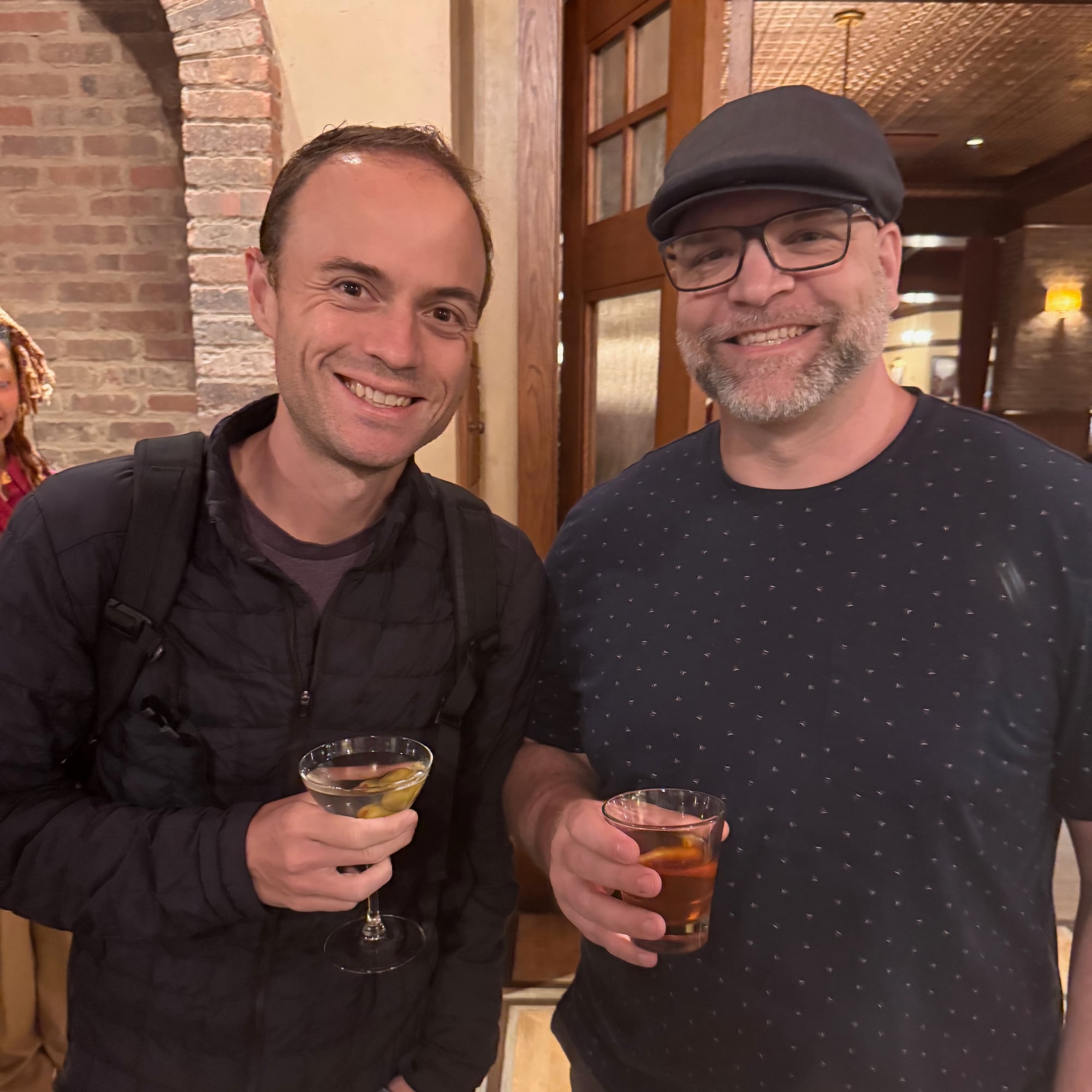You're looking at my e-mail newsletter, Searls of Wisdom, recreated for you here in website form. For the full experience, subscribe and get it delivered to your inbox each month!
Searls of Wisdom for February 2025
Congratulations on beating Level 2 of 2025. Can't wait to see what March has in store for us. A couple new initiatives to share from Searls Industries this month:
- Becky started a podcast in conjunction with her Better with Becky enterprise, where she sells monthly strength-training programs via a curiously-slick web application
- I announced POSSE Party, my first solo product. It will launch later this year, and its goal is to help people escape the post-Twitter diaspora by cross-posting your content to your social accounts on your behalf
Yesterday, I returned from Vegas after attending Test Double's annual retreat and quarterly board meeting. I'm coming to grips with a couple things. First, that I'm entirely okay never going back to Vegas. And second, that I'm entirely okay never going back to who I was the last time I needed a Vegas trip to escape my life.
Speaking of Vegas, I couldn't find a single picture from the trip, so let's all pretend this shot with my longtime colleague and collaborator Dave Mosher wasn't taken at Disney World a week prior:

On a personal note, I've changed in some pretty fundamental ways over the past 18 months, and—in case you've noticed how my character arc is distressingly similar to a bunch of other tech villains—I figured I'd explore my transformation in today's note. Yes, I moved to Florida. Yes, I started caring less how my words make people feel. Yes, I'm prioritizing my own wants and needs over those of others.
In short, I've learned to embrace my inner asshole. And I'm frustrated to report that it's totally backfired. Instead, I'm somehow a kinder, more generous, and all-around better person today than the whole last ten years I spent trying to be good.
The birth and death of @searls
Growing up, I had a keen intuitive sense that living for the approval of others would be stifling and counter-productive. More than most, I desperately yearned for acceptance and validation—the corrosive impact of which I was forced to reckon with at a very young age. In second or third grade, I remember playing H-O-R-S-E at my friend John's house and, as he passed me the ball, he asked why I cared so much what others thought about me. I didn't know the answer.
One way I overcame the fear of being left out was to build myself up. I found my voice early. I developed a sense of taste. I started building a personal brand in high school (nobody knew me as "Justin", only "Juice"). I carried on through college, where my outward persona grew up and evolved in lock-step with who I really was on the inside. People looked at me and saw a guy who was insightful, irreverent, emotionally sensitive, and (most of all) an authentic reflection of his true self.
I managed to keep this up even through my first corporate-flavored jobs out of college. Those roles required a veneer of professionalism—dress code, clean language, respect for authority—but I generally found that when I channeled my true self, I outshone those around me and was rewarded for it. It was going so well that by 2009 or 2010, I was developing a following as @searls on Twitter, speaking at conferences, breaking into the local startup scene, and generating consulting sales for my employer. This culminated in the opportunity to start Test Double in 2011. I poured a lot of myself into its branding and messaging, and I like to think part of its success was that people could sense something real about it.
Things changed the minute we started hiring people.
Running a services company is a fraught exercise for anyone wired to worry about what other people think. You're constantly pinched between the expectations of your customers on one side and the engagement of your employees on the other. And that pressure only increases as the business scales.
As the company and my notoriety grew over the 2010s, I came to be seen less as a man and more as The Man. Each passing year, people in my orbit felt increasingly free to call me out when they didn't like something I said or did. I gradually mastered the art of suffering the unsolicited feedback of others. I would soften my body, plaster a warm-but-not-quite-happy smile on my face, and nod intently as I half-listened to people tell me what I'd done wrong. Then I would react in whatever way they wanted me to: an unequivocal apology; an acknowledgment of privilege or power dynamic; a commitment to do better. I know I was good at this, because people would sometimes pull me aside to compliment me for how good I was at eating shit.
My decision to reflexively apologize in those moments was a self-defense mechanism to shield my reputation so as to avoid putting the business at risk. I got myself into some pretty sticky situations over the years, and I'm still convinced that putting on an utterly phony shit-eating grin was the optimal public relations strategy. (When a rando expresses righteous anger online to someone they perceive as more powerful, I was surprised to learn they are usually not interested in an earnest discussion.) Over time, I learned to prevent these conflicts by using inoffensive language, steering clear of controversial topics, and bottling up my real feelings. And even though I adopted this posture for the sake of the business, it occasionally pitted me against the company's own interests—for example, supporting policies that posed long-term risks in order to avoid stoking the short-term outrage of certain employees.
This simplistic approach to conflict resolution (that is, of immediately and unilaterally declaring defeat) actually worked surprisingly well for the first seven or eight years of the company's trajectory. As our most publicly-visible representative, I managed to successfully thread an incredibly narrow needle. People saw me as provocative but never threatening. As dishing spicy takes that seemed beyond the pale while actually being obvious and agreeable. And it was all going perfectly to plan until the company began to outgrow me. We eventually reached a point where our continued success would demand leadership with a stiffer spine and a more sophisticated approach to conflict. And that would have required me to accept that not everyone was going to like me.
That wouldn't do. The personality I'd been inhabiting—defined by a zero-tolerance policy of anyone ever being mad at me—didn't have the range to stretch into the new roles the business needed leaders to fill. And for me to turn off this phony persona I'd built and revert to my "true self" underneath would have been catastrophically disruptive to everyone around me. Maybe there's a universe where I could have moderated somewhat and found a workable midpoint, but to be honest, the risk of losing myself by blending authenticity with artifice was just too great. I'd already been sanded down enough. I wasn't going to accept even more compromise as a long-term solution.
Essentially, I was forced to choose between ascending into a genuine leadership role as either a people-pleasing worm unable to make tough decisions or a human tornado wreaking havoc wherever people encountered the "real" me.
It didn't take long to realize the only winning move was not to play. So, with the love and support of my colleagues, others stepped up and put in a lot of work so that I could sidestep joining our burgeoning leadership team. Meanwhile, I began (in what ultimately became a four-year process) to help ensure the business could thrive without my direct involvement. Concurrently, I began (in what ultimately became a four-year process) to shed the facade I'd erected to burnish my reputation and reclaim the identity I'd been suppressing for a quarter of my lifespan.
So here I am now. Just a middle-aged dude with a podcast.
The hidden cost of trying to be
Earlier, I suggested that my inner asshole was a more benevolent human than the "good" person I'd been trying to be for all those years. How could that be?
The answer is that trying takes time and energy, and we as humans have finite amounts of both. I learned the hard way that every layer I inserted between my authentic self and the outside world imposed hidden taxes and penalties I often failed to account for at the time.
Every time I took someone's feedback, I threw it on a pile of deeply-nested (and often contradictory) if-else statements. Whenever I have a thought, I visualize myself puzzling out a series of rules like this one to determine what is acceptable for me to say or do:
IfI'm at young adult book club,thenI should avoid using the word "throb",unlessI'm referring to former teen hearthrob Jason Bateman
Over the course of our lives, we all add rules like this as we encounter the world, but being as permissive in appending new rules as I'd been for the sake of my career was utterly exhausting. Just thinking about it now makes me want to use italics.
In AI/LLM terms, all those years of uncomfortable social encounters was my internal model's "training cost" and the amount of if-else processing that happened each time I formulated a complete sentence was its "inference cost." I wasted years of my prime staring at angry quote-tweets as my heart raced and I allowed any Tom, Dick, and Harry to reprogram how I interfaced with the world. I wasted seconds of every minute and minutes of every hour executing that program one bullshit rule at a time.
What's a synonym for throb? Pulse? Too soon after that shooting, though? Quiver! I'm sure they'll love quiver.
This cost compounds. If you're putting in so much work for the sake of being liked by other people, constantly feeling drained and frustrated only increases the risk you'll lose your cool when it counts.
The cumulative effect of those hidden costs goes far beyond mere energy expenditure. It can lead to avoiding social interaction with other people. I found myself becoming more and more closed off and reclusive. It can impact one's health, as well. My bloodstream spent a decade soaked in cortisol by day and vodka by night. And repressing your true self long enough can lead to bitter resentments that undermine the entire reason you're being fake! I grew to dread getting up for work at a job of my own design and found myself fantasizing about getting permission to quit my own damn company.
Not good!
Anyway, if you're reading this and thinking of ways you've been unnecessarily presenting some fake version of yourself to the world, my recommendation would be to simply stop doing that.
Who I am now
Now that I'm more concerned with building cool shit than convincing other people my shit is cool, I've flipped my relationship with how I engage with the world. Wherever I go, I'm there on purpose and I have the presence of mind to treat people like they matter. To actually listen. To give a shit about people.
It was also time for me to give up on live-tweeting my life as @searls in the vain hope that others' faves and retweets might sustain me. Now I just post everything I do to my boring-ass website and mostly ignore the social platforms. I'm doing some of my best work right now, but I'm at peace with the fact that fewer people might ultimately see it.
(That said, I have no intention of withdrawing from the world entirely, which is why I'm building POSSE Party—so that you and me and anyone who wants it can reach people without scrolling around in filth all day.)
I honestly wasn't sure if the person I was in college could be resuscitated, but I was ecstatic to find him alive and well. I worried deep down the person I remembered was a total piece of shit as well, but fortunately he was just in his early 20s last time I saw him and his prefrontal cortex wasn't fully-baked yet. I also considered he might not want to keep blogging and programming and learning Japanese, but then I remembered those were all the things he was doing before I started pretending to be someone else.
So anyway, if you and I first crossed paths after 2011, I figured I should mention that, fear not, I'm still very much the same dude. The only difference now is that I'm finally free to show you my authentic self. It's why my podcast has so many dirty words in it. 🍿

